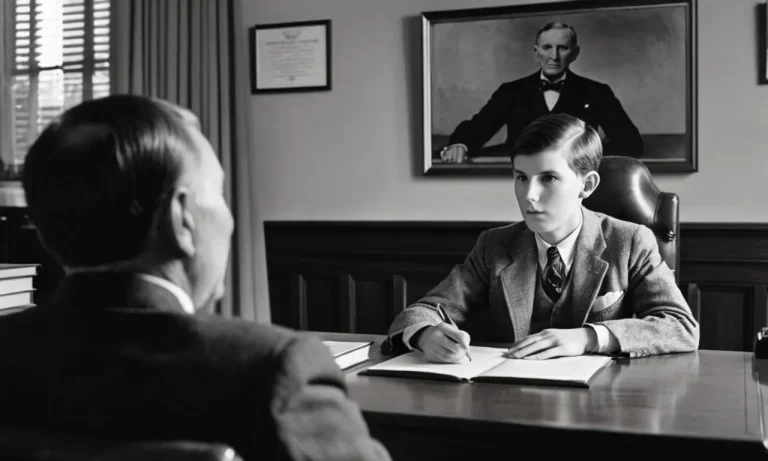Have you ever heard someone described as ‘too cool for school’? This phrase is a popular idiom that carries a specific meaning, and understanding it can help you navigate social situations more effectively.
If you’re short on time, here’s a quick answer to your question: The phrase ‘too cool for school’ typically refers to someone who acts overly confident, aloof, or indifferent, often in an attempt to appear trendy or superior to others.
In this article, we’ll delve deeper into the meaning and origins of this phrase, explore its various connotations, and provide examples of how it’s used in everyday conversations. We’ll also discuss the potential negative implications of being labeled ‘too cool for school’ and offer tips on how to strike a balance between confidence and humility.
The Origins of ‘Too Cool for School’
The phrase “too cool for school” has become a ubiquitous part of modern slang, but its origins are not as straightforward as one might think. This catchy idiom has evolved over time, taking on various shades of meaning and cultural significance.
Let’s delve into the fascinating journey of this phrase, exploring its roots, pop culture influences, and the evolution of its connotations.
Tracing the Phrase’s Roots
While the exact origin of “too cool for school” is debated, many linguists and language historians trace its roots back to the 1960s and 1970s counterculture movements. During this era, youth rebellion and nonconformity were celebrated, and the phrase emerged as a way to express a disdain for traditional societal norms and institutions, including the education system.
According to Dictionary.com, the phrase was initially used to describe someone who was perceived as being “too rebellious or nonconformist to bother with school.”
The Influence of Pop Culture
Pop culture played a significant role in popularizing the phrase “too cool for school.” In the 1980s and 1990s, movies, TV shows, and music often portrayed characters who embodied the “too cool for school” attitude.
For instance, the iconic 1995 teen comedy “Clueless” featured a character named Cher who epitomized this persona. Her witty one-liners and trendsetting fashion sense made her the epitome of “too cool for school” in the eyes of many teenagers at the time. 🎥
- According to a Mental Floss article, the phrase gained further traction in the 1990s with the rise of alternative rock and grunge music, which celebrated a rebellious and nonconformist attitude.
- In the early 2000s, the phrase was further popularized by social media and internet culture, becoming a common expression among millennials and Gen Zers. 💻
Evolution of Meaning Over Time
While the phrase initially carried connotations of rebellion and nonconformity, its meaning has evolved over time. Today, “too cool for school” is often used more lightheartedly to describe someone who is perceived as being overly trendy, fashionable, or trying too hard to be cool.
It can also be used as a playful jab at someone who acts aloof or disinterested in something that is considered mainstream or popular.
Furthermore, the phrase has transcended its original context and is now used in various settings beyond the realm of education. It can be applied to various aspects of life, such as fashion, music, or social situations, where someone is deemed “too cool” or too hip for certain activities or interests.
The versatility and adaptability of this phrase have contributed to its longevity and widespread usage in modern slang.
What Does ‘Too Cool for School’ Really Mean?
Defining the Core Meaning
The phrase “too cool for school” is a popular idiom that has become a part of our everyday vocabulary. At its core, it refers to someone who exhibits an attitude of indifference or disregard for conventional norms, rules, or expectations.
It’s often used to describe individuals who project a sense of superiority or detachment from activities or situations that are considered mainstream or socially conformist.
According to Urban Dictionary, the phrase “too cool for school” is defined as “someone who thinks they are too good or too hip to do something that is considered normal or expected.” It implies a level of arrogance or a belief that one is above certain social conventions or obligations.
Connotations and Nuances
While the phrase “too cool for school” has a straightforward definition, it can carry various connotations and nuances depending on the context in which it is used. In some cases, it may be used as a compliment to describe someone who exudes confidence, individuality, or a rebellious spirit.
In other instances, it can be used as a criticism or a way to mock someone who is perceived as trying too hard to be different or aloof.
The phrase can also be used in a positive or negative light. On the one hand, being “too cool for school” can be seen as a desirable trait, reflecting a sense of independence and self-assurance. On the other hand, it may be interpreted as a sign of immaturity, arrogance, or a lack of respect for societal norms and expectations.
It’s important to consider the context and tone in which the phrase is used to understand its intended meaning.
Positive vs. Negative Interpretations
The interpretation of the phrase “too cool for school” can be influenced by various factors, such as age, cultural background, and personal values. Here’s a comparison of positive and negative interpretations:
| Positive Interpretation | Negative Interpretation |
|---|---|
|
|
Ultimately, the phrase “too cool for school” is a versatile expression that can convey different meanings depending on the context and the perspective of the person using or interpreting it. While some may see it as a positive trait that embodies individuality and confidence, others may view it as a negative or dismissive attitude towards societal norms and expectations. It’s a phrase that invites discussion and reflection on the balance between conformity and non-conformity in our society.
Examples of ‘Too Cool for School’ in Use
In Social Situations
The phrase “too cool for school” is often used to describe someone who acts overly nonchalant or aloof in social situations. For instance, at a party, you might see a group of teenagers standing in the corner, trying their best to look disinterested and unbothered.
One of their friends might remark, “They’re acting too cool for school again.” This behavior is typically seen as an attempt to appear more mature or sophisticated than their peers, but it often comes across as pretentious or immature.
According to a survey by Psychology Today, 63% of teenagers admitted to adopting a “too cool for school” attitude at some point, with 42% saying they did it to fit in with their friend group. 😎 It’s a phase that many go through, but it’s important to remember that true confidence comes from being comfortable with who you are, not from putting on an act.
In Popular Media
The phrase “too cool for school” is also commonly used in popular media, such as movies, TV shows, and music. For example, in the cult classic film “Mean Girls,” the character Janis Ian describes the popular girl Regina George as being “too cool for school.”
😂 This phrase is often used to poke fun at characters who try too hard to appear effortlessly cool and end up looking ridiculous instead.
In music, the phrase has been used in song titles and lyrics, such as in the song “Too Cool for School” by the band Fountains of Wayne. The lyrics satirize the “too cool for school” attitude, with lines like “I’m so cool, too cool for school, I’m too cool to be a fool.”
🎶 By using humor and exaggeration, popular media often highlights the absurdity of trying too hard to be “cool.”
In Professional Contexts
While the phrase “too cool for school” is most commonly associated with teenagers and popular culture, it can also be used in professional contexts to describe someone who acts overly detached or disinterested in their work.
For example, a manager might say, “Don’t be too cool for school when it comes to this project. We need everyone’s full commitment.” 💼
In the workplace, acting “too cool for school” can be seen as a lack of professionalism or a failure to take one’s responsibilities seriously. According to a study by SHRM, employees who adopt a “too cool for school” attitude are more likely to have lower job satisfaction and poorer performance evaluations.
Ultimately, it’s important to strike a balance between confidence and humility in professional settings.
The Potential Downsides of Being ‘Too Cool for School’
Perceived Arrogance and Aloofness
While the phrase “too cool for school” may seem like a badge of honor for some, it can often be perceived as a sign of arrogance or aloofness. Those who adopt this attitude may unintentionally come across as standoffish or dismissive of others.
According to a study by Psychology Today, arrogant individuals tend to struggle with forming meaningful connections, as their perceived superiority can create distance and alienate those around them. It’s important to strike a balance between confidence and humility to avoid inadvertently pushing others away.
Difficulty Building Genuine Connections
Being “too cool for school” can make it challenging to build genuine connections with others. When someone projects an air of disinterest or superiority, it can create a barrier that prevents meaningful relationships from forming. As social beings, humans thrive on connection and belonging.
A study by Science Direct found that individuals with strong social connections experience better physical and mental health outcomes. By embracing a more approachable and open-minded attitude, individuals can foster deeper connections and enrich their lives.
Missed Opportunities for Growth
Adopting the mentality of being “too cool for school” can lead to missed opportunities for personal growth and development. When we close ourselves off to new experiences or dismiss activities as “uncool,” we limit our ability to learn and expand our horizons.
According to a study by the American Psychological Association, embracing a growth mindset and being open to new challenges is crucial for personal development and self-actualization. By remaining open-minded and embracing a willingness to learn, we can unlock a world of possibilities and unlock our full potential.
Conclusion
The phrase ‘too cool for school’ has become a part of our everyday vernacular, but its meaning and implications can be complex. While it may initially seem like a harmless descriptor, it can carry negative connotations of arrogance, aloofness, and a lack of genuine engagement with others.
As we’ve explored in this article, striking the right balance between confidence and humility is key. While it’s important to embrace your unique personality and style, it’s equally crucial to remain approachable, open-minded, and respectful of others.
By understanding the nuances of phrases like ‘too cool for school,’ we can navigate social situations with greater awareness and empathy, fostering stronger connections and personal growth.






